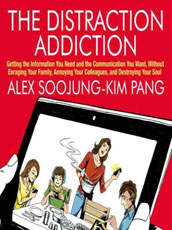"Trying to keep up with real time can exact a high price. It creates services to make online life and communication quicker and more frictionless — one-click purchasing; texts rather than e-mails. It disrupts life to make life more seamless. Trying to live at the speed of finance and commerce and communication forces us to focus on the present moment — the present instant — and erodes our ability to slow down and think. 'Minds, organizations, cities, entire societies all need time to integrate and process new ideas,' futurist Anthony Townsend says. 'If you think you have to constantly, instantly react, rest and contemplation and deliberation — the ability to think about what you're doing — disappears.' Relentless, constant exposure to real time, he argues, 'destroys both decision-making and contemplative ability.'
"So Heschel's vision of the Sabbath as an invitation to step into a 'palace of time' that hints of eternity and experience time set to the clock of creation rather than the speed of light is more valuable today than ever. In ways that Heschel did not predict but would have appreciated, today's digital devices and virtual spaces create a terribly intimate 'tyranny of things.' We labor, as people always have, 'for the sake of things.' But, Heschel noted, "'possessions become the symbols of our repressions, jubilees of frustrations. . . . Things, when magnified, are forgeries of happiness, they are a threat to our very lives.' We unconsciously treat computers like people, and our mobile devices act like toddlers: they're super-responsive, simultaneously eager to please and oppressively demanding, always on, and insistent that we pay attention to them. Today, we live our lives with and through objects that compress our experience of time, that replace the rhythms of days and bodily metabolisms with the 24-7 real time of networks and markets. Heschel's warning that 'we are more harassed than supported by the Frankensteins of spatial things' seems truer than ever, especially now that those Frankensteins have begun to demand their creators' attention and love.
"What The Sabbath offers is a day in which it's acceptable to step away from all of that. For one day a week, it's all right to 'collect rather than to dissipate time,' to 'mend our scattered lives.' This is where digital Sabbatarians are headed. They intuit that behind the language of disconnection lies an opportunity to do something very profound: to mend one's relationship with time. It's a chance to learn how to collect rather than dissipate time; an invitation to experience a more majestic, mystical time that lengthens one's capacity for attention and for presence; and an opportunity to make meaning in life. . . .
"Abraham Heschel saw the Sabbath as a counterbalance against modern 'technical civilization,' a way 'to work with things of space but to be in love with eternity.' In Heschel's reading of Genesis, the seventh day was when God created happiness and tranquility and perfected the universe; it was not the end of Creation but its culmination. Heschel argued that we're obliged to re-create that happiness and tranquility. 'Rest without spirit,' he warned, is 'the source of depravity.'
"The Sabbath isn't a day for mindless leisure or diversion. For Heschel, Sabbath rest was not passive; it was active. In The Sabbath, Heschel was impressively silent about whether any particular activity should or shouldn't be undertaken on the Sabbath. You'd never know that his colleagues argued about whether Jews in the suburbs should be allowed to drive to synagogue, or whether pushing a button on an elevator counted as work, or whether electricity was a form of fire that should not be lit. Avoiding work, for Heschel, did not mean being inactive. It meant avoiding the kinds of economic, 'productive' busyness that occupied people six days of the week in order to create a space in which one could do other, more important things, and do them well. 'Labor is a craft,' he said, 'but perfect rest is an art. To attain a degree of excellence in art, one must accept its discipline, one must adjure slothfulness.' Heschel wasn't advocating passive rest, in other words, but restoration.
"Those who get the most out of the digital Sabbath use it as a time to rebuild themselves, to reengage with friends, to relearn and exercise treasured predigital abilities, to reconnect with the real world. Turning off the million little requests and interactions that cascade into distraction and exhaustion is good, but trying to recover your mind just by unplugging is like trying to fix a building by abandoning it. The digital Sabbath is defined not only by what you turn off and ignore but also by what you do with the pauses. Unplugging is the means; rediscovering a more human sense of time and rebuilding your spirit are the ends."
